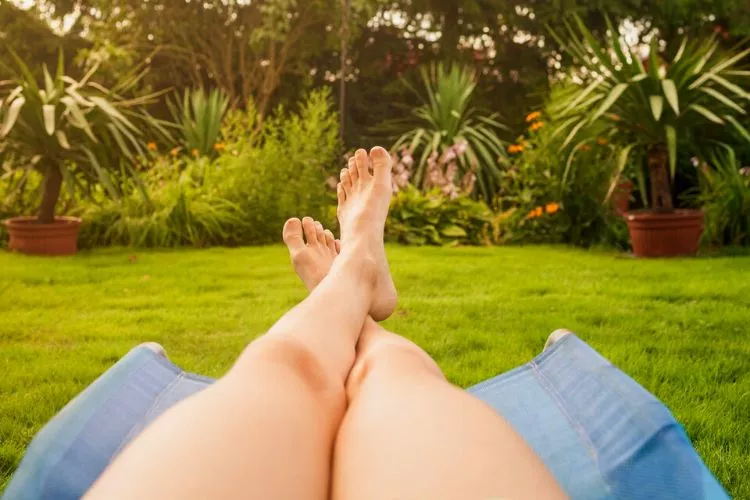Sunbathing in your backyard is a great way to get much-needed Vitamin D and relax outdoors. But is it legal to sunbathe in your backyard? In most cases, yes, it is! In the United States, homeowners can usually enjoy sunbathing in their own yards without running afoul of any local laws.

However, regulations may limit clothing or hours when people are allowed to tan. Before you set up your lounge chair and bask in the sun, check what rules apply where you live. Moreover, respect your neighbor’s right to privacy – never go past their property line!
Is it legal to sunbathe in your backyard?
In the United States, sunbathing in your backyard is generally legal. However, local laws and regulations may vary depending on where you live. It’s important to check what rules apply in your area before you set up a lounge chair and relax in the sunny sunshine.
Some places may have restrictions on clothing or times when people are allowed to sunbathe, so be sure to familiarize yourself with all relevant laws and regulations. Additionally, respect your neighbor’s or community’s right to privacy and not overstep any boundaries.

Though some states have different nuances regarding the legality of sunbathing, it is generally permitted for individuals who want to make the most of their backyard oasis!
State Laws and Regulations
Laws and regulations concerning sunbathing in your backyard can vary significantly from one state to the next. For example, some states may require that curtains be kept closed while sunbathing occurs, whereas others may only allow it between certain hours of the day. In addition, there may be restrictions on clothing or activities that cannot take place while enjoying a day in the sun.
Homeowners should therefore check what rules apply in their area before they set up a lounge chair and bask in the sunshine. Furthermore, it is important to remember that respecting your neighbor’s right to privacy must always come first!
Some states may place restrictions on sunbathing in the backyard. For instance, in California, it is illegal to sunbathe in your backyard between 10 am and 6 pm if you do not have curtains or other privacy protection. In Florida, certain activities like swimming and sunbathing are prohibited if visible beyond a person’s property line.
Furthermore, in Utah, it is illegal to sunbathe while wearing any clothing which reveals “private parts” of the body. Additionally, some states require that individuals get permission from their neighbors before engaging in sunbathing if they are visible within a certain distance from a neighbor’s property line.
These laws and regulations vary from state to state, so always check what applies in your area before you set up a lounge chair and bask in the sun!
Homeowner’s Association Rules
Homeowner’s Association (HOA) rules can also affect the legality of sunbathing in your backyard. For example, some HOAs may have restrictions regarding what type of chairs or furniture can be used for sunbathing and where it must be kept.
In addition, many HOAs have regulations about noise levels and activities that constitute a nuisance, such as loud music. All these rules should be taken into account by homeowners if they plan on sunbathing in their backyard. Furthermore, many HOAs also issue warnings or fines to those not following their guidelines.
Therefore, checking with your HOA before opening a book and settling down in the sunshine is important! Adhering to HOA regulations will ensure everyone enjoys a beautiful sunny afternoon without disruptions or problems.
Homeowners Association (HOA) rules regarding sunbathing will vary depending on the association. However, some common regulations include limiting the type and size of furniture allowed in a backyard, setting specific noise levels allowed during the day, and even requiring neighbors to be notified before engaging in sunbathing.
Additionally, HOAs often restrict how often and for how long guests can stay over and conditions for parties within your yard. For example, many HOAs require that music or other disruptive activities cease by a certain hour. Finally, some HOAs may even limit what people can wear if they sunbathe outside their homes. It is important to check with your HOA regarding their specific rules so you can enjoy a relaxing afternoon free from nuisance-related issues!
Privacy and Nudity Laws
Several privacy and nudity laws can affect sunbathing in your backyard. For example, if you live in a place with a “lewd conduct” law, you may be fined or arrested for sunbathing nude. Additionally, even if there’s no law against nudity, your neighbors may not appreciate it if you sunbathe naked in your backyard, where they can see you.
In addition, there are also laws against voyeurism, which is when someone watches another person in a private setting without their consent. So, if you sunbathe in your backyard and someone watches you from their yard or a nearby building, you could potentially press charges against them.
Finally, it’s important to remember that even if you’re on your property, you’re still subject to trespassing laws. So, if someone enters your yard without your permission to take a look at you while you sunbathe, they could be charged with trespassing.
Depending on the state and county you live in, specific privacy and nudity laws may be relevant to backyard sunbathing. Generally speaking, engaging in public indecency or exposing oneself in public is illegal.
Therefore, if you plan on sunbathing in your yard, it is important to ensure it is not visible to the public. Additionally, many states have lewd conduct laws that criminalize any “obscene” or “offensive” activity. This can include anything from going nude to engaging in sexual acts outside.
It is also important to note that it is illegal for someone else to enter your property without permission to view you while you’re sunbathing. Lastly, voyeurism laws are important when discussing backyard sunbathing – taking pictures or videos of someone with a reasonable expectation of privacy. At the same time, being undressed can be punishable depending on the circumstances.
Safety And Environmental Considerations
When sunbathing in your backyard, it’s important to consider both safety and environmental concerns. First and foremost, you must make sure that you take the necessary precautions to protect yourself from the sun’s rays. This includes wearing sunscreen with a high SPF rating and protective clothing.
Additionally, be mindful of the impact your activities may have on the environment – if you don’t want to apply sunscreen directly to grass or plants in your yard, look for eco-friendly alternatives such as natural oils or zinc oxide-based creams safer for the environment.
Lastly, be aware of any hazards in your yard, such as bugs or sharp objects that could cause harm while you’re sunbathing. It may also be wise to check local regulations regarding open burning before enjoying a bonfire in your backyard—this can help keep yourself and the environment safe.
- Wear appropriate protective gear such as a hat, sunglasses, and sunscreen with a high SPF rating before sunbathing in your backyard.
- Look for natural oils or zinc oxide-based creams instead of traditional sunscreen if you don’t want to apply it directly on the grass or plants in your yard.
- Be aware of potential hazards in your yard – watch out for sharp objects, bugs, or other dangerous creatures that may appear while relaxing.
- Restrict access to your property – make sure nobody can enter your backyard unlawfully while you are sunbathing.
- Make sure to rotate and move around every few minutes so that you don’t expose any part of your body to the sun for too long.
- Monitor yourself throughout the session – check for any signs of heat exhaustion or dehydration and take regular breaks if needed.
- Throw away any trash generated from sunbathing properly to help reduce its environmental impact.
You May Also Find Useful: Can Adults Go To Bounce Houses?
Conclusion:
To conclude, it is indeed legal to enjoy sunbathing in your backyard. However, it’s important to consider the necessary safety and environmental considerations, such as using protective clothing, monitoring your exposure to the sun, and disposing of any trash generated properly. With these precautions in mind, you can relax and make the most of a sunny day without worrying too much about the legalities of sunbathing.


